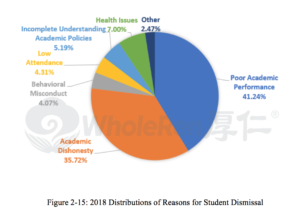The huge influx of Chinese students into U.S. colleges has opened new opportunities for study abroad agencies – crisis management for students who received expulsions from schools.
While President Trump relentlessly blamed China for taking away hundreds of thousands of jobs in the country, Chinese students have made a whopping contribution to the U.S. economy over the past decade. As the fasting-growing importer of U.S. services, the exports services to China recorded a jump of 307% from 2007 to 2016, while travel, including education, accounted for $29.9 billion of the export market in 2016, a report from the U.S.-China Business Council showed.

Source: The U.S.-China Business Council
In 2016/17, there were 350,755 Chinese students enrolled in an educational institution in the U.S., about one-third of the international students in the country, according to the Open Doors report published by the Institute of International Education.
Supported by the Bureau of Educational and Cultural Affairs at the U.S. Department of State, Open Doors is a data portal with information about international students studying in the U.S. or American students enrolling in study abroad programs.
As American universities are constantly inundated with Chinese students, a lucrative business opportunity has emerged – education agencies filing college applications for students in China.
Chinese Education Organizations Are on a Rise
Kudos to services delivered by her consultants, Viola Chen, a native Chinese, received her acceptance letter from Boston University in 2013. The RMB 50,000 service, equivalent to more than $7,000, gave Chen a package of 10 college applications. “The price of packages ranged from RMB 50,000 to RMB 200,000, depending on the experience and qualification of the advisors,” Chen said. “I had the cheapest plan,”
The lack of English proficiency and familiarity with American education has made Chinese parents willing to pay for application services worth tens of thousands of dollars. When admission packages arrive at their doors, all those charges pale into insignificance. “They don’t want to risk the opportunity, getting into good schools outweighs the additional service fees.” Chen said.
The booming industry features a one-stop solution for students seeking services pertained to college applications: tutoring classes for SAT and TOEFL tests, internship arrangement, essay editing, application mailing services, visa interview preparation, and meet-and-mingle networking events among students.
As a token of celebration, students attending similar-ranking universities will get the chance to meet at parties organized by the agency prior to the start of school year. “We get the network in China, and expand it in the U.S.,” Chen said.
To meet this mounting demand for college-admissions consulting, a glut of companies in China have hopped on this bandwagon over the past 10 years. However, the growing reliance on agencies has laid bare a serious consequence among this massive population – susceptibility to academic dismissal.
According to a report from WholeRen Education, 5,631 of their students were involved in the process of expulsion from 2013 to March 2018, while poor academic performance and academic dishonesty were the two major causes of dismissal.
“We have around 10 students seeking emergency services or help every day, either through regular channels or social media,” Jennifer Cao, an L.A.-based consultant at WholeRen Education, said.
WholeRen Education is a company headquartered in Pittsburgh, Pa., with operations in eight cities across the U.S., and three in China. To facilitate its business with Chinese students, the majority of its staff are native Mandarin speakers with experience studying in the U.S.
Apart from traditional agency services, the company also carries out a crisis management plan, namely emergency services, for students who are on the verge of getting expelled from schools. It is the pioneering education organization in the U.S. to provide second-chance solutions to academic expulsions, the report said.
“We see the opportunities, students are having problem going through these emergency matters.” Cao said.
The emergency consultation offers a series of services, including advising on how to win an expulsion hearing, ironing out the college transfer process, and providing daily supports to students with mental health issues. Service charge varies from cases to cases. It typically ranges from $1,500 to $4,500, the most expensive package, however, can go up to $50,000 per year.
Cultural Context Behind the Expulsion Story
With the overall surge in Chinese household wealth, sending children abroad is now an honorable move showcasing the family’s socioeconomic status. But the cultural clash between the U.S. and China remained as a major roadblock for Chinese students to perform their ability in the best possible light. It is not true that every child is well-versed enough in an English-speaking environment and the American education system before embarking on their college journey.
“Psychological preparation is a problem, language is another,” Cao said. “Some of them can’t even understand English,”
While there are a host of reasons contributing to the number of dismissal cases, disparity in teaching style appears to be one of the most patent factors. The spoon-feeding education in China made the parent-teacher oversight an important part of learning. With the teacher-led recitation, jam-packed tutoring schedules and strict parental supervision, students excel at academics under the Chinese education system.
Getting adapted to the American teaching style could be nothing but challenging to them. “The story is different here in the U.S.,” Cao said.
When limited guidance and language barriers come into play, these students would easily fall into the trap of skipping school or using ghostwriting services. If they are lucky enough to hide the shenanigans from schools, they could still celebrate college graduation by tossing their caps into the air. But at the same time, Cao said it could pose serious academic threats to those who get caught.
So when it comes to emergency cases, consultants might have to fight daily battles with students over completing their assignments or force them to attend lectures by knocking on their doors. “We are like their parents in the U.S. and help them develop the way right to study.” she said.

Leave a Reply
You must be logged in to post a comment.